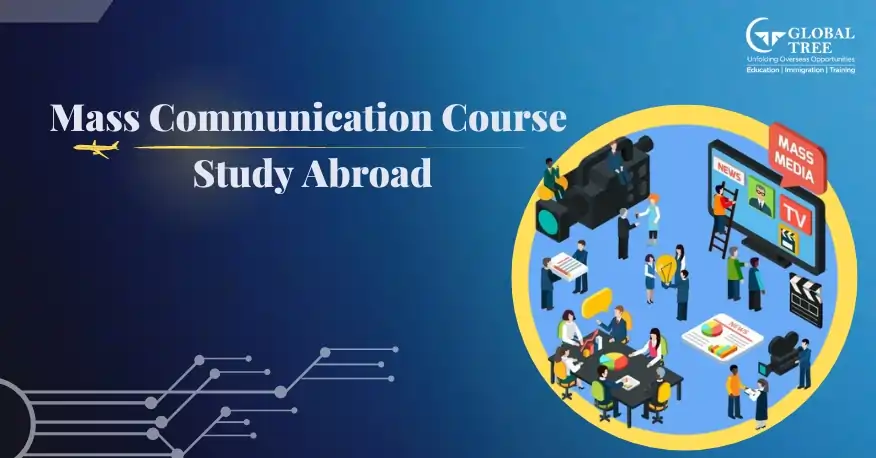Mass Communication Course to Study Abroad

Introduction
Mass communication is the process of sending messages to many of people at once. It can be viewed as a more comprehensive circulation of information both inside and between regions on a global scale. It is a branch of research that examines how to successfully convey and disseminate news and information via social media, books, newspapers, magazines, televisions, and radio using print and digital media.
The studies of mass communication primarily concentrate on how the information persuades or influences the actions, attitudes, views, and emotions of the audience.
Who is eligible to study Mass Communication Course Abroad?
Students that exhibit creativity, spontaneity, and strong interpersonal and communication abilities may decide to study or work in the field of mass communication. Choose the Best Mass Communication Course & Colleges to Study Abroad. Students will gain a thorough comprehension of media rules and ethics during their studies, as well as a working knowledge of contemporary communication techniques. You can succeed in the field if you have other traits like curiosity, tenacity, and determination.
How much does it cost to study Mass Communication Course Abroad?
Students may pursue a bachelor's degree abroad in mass communication after graduating from high school. The course material comprises an introduction to international politics, journalism, film production, publishing, and global media. The four-year program can cost up to $68,000.
Graduates in mass communication may continue their education by pursuing a master's degree abroad in Mass Communication. The majority of the coursework is based on research, and it concludes with the submission of a thesis. In addition to Strategic Communications in a Global Environment, students frequently concentrate on Media Ethics, Communication Research, Digital Production, Media Laws, and Ethics. The cost of the degree in the US can reach $48,900 over the course of two years.
Students may pursue a Ph.D. in the area if they want to develop their specialization or try to advance their careers. The completion of coursework, which typically consists of seminars and theoretical sessions, is expected of all students. According to the requirements of your certification, many institutions also hold a thorough examination where students are required to teach a class, conduct a field survey, write a dissertation, participate in an oral examination, and submit a research paper. In the US, the degree might take three to five years to complete and could cost up to $45,000.
What is the Future Scope of Mass Communication Course Abroad?
In this decade, it is expected that employment in media and communication-related fields will increase by 14%, faster than the average for all occupations. By 2030, there will probably be 151,500 additional positions in the mass communication sector. The requirement to produce, edit, translate, and transmit information through a range of diverse platforms, including social media, is anticipated to increase demand for jobs in the media and communication sectors.
Trending Career Options in Mass Communication Course Abroad
After finishing the bachelor’s degree in Mass Communication successfully, there are numerous employment opportunities available.
Career as a Communications Director
A director of communications is in charge of keeping an eye on the information that is distributed to the public by an organization. They manage a communications staff and create campaigns for communication, public relations efforts, and marketing plans. In the US, a director of communications typically earns $90,000.
Career as a Public Relations Professional
These professionals are involved in preserving a positive public image for their customers and companies. In order to present a positive image of the clientele, they must be skilled in problem-solving and handling the media. In the US, a public relations expert makes an average pay of $62,800 per year.
Career as a Journalist
Investigating, compiling, and delivering noteworthy information about diverse past, present, and future events is the main responsibility of a journalist. They pursue leads, establish connections with potential sources, conduct first-hand research, and conduct secondary research. In the US, a journalist's yearly compensation is on average $48,370.
Career as a Movie Editor
For the purpose of creating movies and shows, film or video editors manipulate pictures on a screen. They guarantee that the images are synchronized and in the right order. In the US, a film editor makes an average compensation of $60,360 per year.
(Read more: Top highly affordable universities to study abroad)
Career as a Media Strategist
To plan, carry out, and supervise advertising and marketing campaigns for various promotional goals, media planners collaborate with advertising agencies, PR firms, and corporations. In the US, a media planner has an average compensation of $60,319 per year.
Event Director
They handle the organizing, management, execution, and supervision of numerous private and public events. Event managers meet with clients to discuss the goals, requirements, and budget of the event. Finding and booking venues, obtaining licences, haggling with sponsors, and communicating with suppliers are all part of their duties. In the US, an event manager's yearly compensation is on average $55,550.








